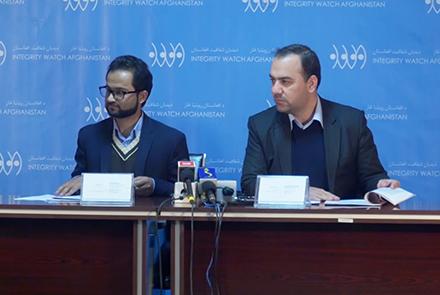The national budget is still open to misuse by lawmakers in the Wolesi Jirga, the Lower House of Parliament, and powerful figures inside government and the Ministry of Finance despite having been reformed, Integrity Watch Afghanistan says in a report, Analysis of the National Budget 2018.
The watchdog says in the report that MPs use their power to reject the budget draft for each year as a tool to add their “personal demands” in the document.
According to the organization, at least half of development projects are affected by political interventions, particularly from MPs.
“The Ministry of Finance can adapt projects anywhere and easily if the amount of money of the projects and their location is not known. Therefore, there is a risk of misuse (of the budget) by the finance ministry and as well as by lawmakers; and it is serious,” the CEO of Integrity Watch Afghanistan, Mohammad Ikram Afzali said. “Maybe a number of powerful figures in government will also influence the projects.”
The findings of the watchdog show that after the rejection of the draft budget for next fiscal year, government and the Wolesi Jirga agreed to add two favorite projects for each lawmaker in the budget to open the way for its approval by the parliament.
According to the organization, some MPs try to give the projects to their relatives despite they interfere with them.
“Last year, according to an agreement between the Wolesi Jirga and government, 370 projects worth more than $70 million USD were added to the 1396 (solar year) budget. This was done against Afghanistan’s Constitution, under the pretext of upcoming elections.
The reason that the lawmakers rejected the budget for the first time was to create a bargaining ground for them,” said Naser Taimori, an official of Integrity Watch Afghanistan.
Meanwhile, the Wolesi Jirga’s administrative board said the discussion of lawmakers with the government on approval of the budget as due to demands and requirements of the people.
“Our advice for them (the watchdog) is that do not talk without documentary proof; do not talk about the thing that you don’t have information about. Otherwise, we will have to introduce you to the judicial organizations,” Abdulqader Zazai Watandost, the secretary of the Wolesi Jirga, told TOLOnews.
The Ministry of Finance meanwhile said the budget is made based on the demands and priorities and in accordance with international norms.
Mohammad Aqa Kohistani, deputy minister of finance for administrative affairs, said the ministry considers MPs’ views on the budget.
“The national budget is sent to the parliament based on a recommendation by ministries and independent budget organizations after assessment of the cabinet’s budget committee. After approval of the cabinet, it is sent to the parliament for approval and then the views of MPs are seriously considered in it,” he added.
Meanwhile, the Integrity Watch Afghanistan said it is concerned about a 42 percent reduction in the next year’s development budget – compared with the year before.
Click here to read the full report.


